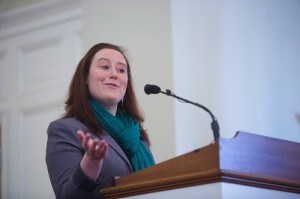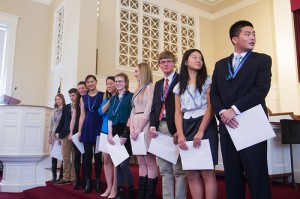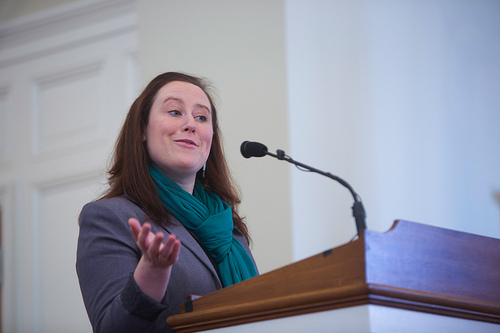 Before she covered the eclectic topics she had planned for her speech—calculus, the end of modern day slavery, and grizzly bears, among them—Allison Arbib ’03 had to give a disclaimer.
Before she covered the eclectic topics she had planned for her speech—calculus, the end of modern day slavery, and grizzly bears, among them—Allison Arbib ’03 had to give a disclaimer.
“You may assume that I’m here because I was Cum Laude myself,” she told the assembled community during the Cum Laude Society Induction Ceremony on January 11. “I was not.”
Unlike the 10 seniors being honored during the all-school assembly, Arbib said she had always felt there was “some measure of excellence I came close to but never quite reached.” She had even received a C+ grade in calculus, she said.
“What I’ve learned— what I’m still learning— is that excellence is about working really hard every day to try and make things better, whether anyone is watching or not,” she said. “That there’s beauty in that struggle.”
In her own work, Arbib, the raw materials department manager at Amherst-based NGO Verité, has traveled the world in the quest to help international corporations learn about the actual people who make their products.

“The things you eat, the things you wear, the things some of you are probably texting on right now, someone made that,” she said. “It’s our job to make sure they do so with safety, humanity, and fair wages.”
She described a hypothetical 22-year-old worker from the Philippines: a person who would go on a quest for a better life, and in search of a job, would end up deeply in debt to a Taiwanese factory manager. Such modern day slavery happened all over the world, she said, and would not come to an end all at once.
“Instead, it’s lots of little acts,” Arbib said. “It’s continuously striving for something better. It isn’t glamorous. But it’s real.”
In a twist that was later applauded by students on Twitter, Arbib described how taking small steps to create big change were a bit like the grizzly bears in Glacier National Park. Over their lifetimes, the bears pawed through enough brush and moved enough dirt that they were actually considered a geological force, comparable to plate tectonics or wind and rain.
“This is how change gets made,” Arbib said. “The daily grind of bears digging up grubs.”
And the best part? The students were already doing it, she said.
“Keep going. Keep digging. Keep asking questions,” Arbib said. “You’ll move the earth.”


